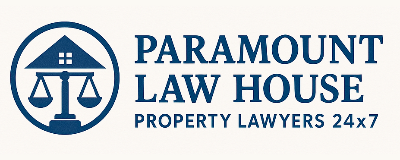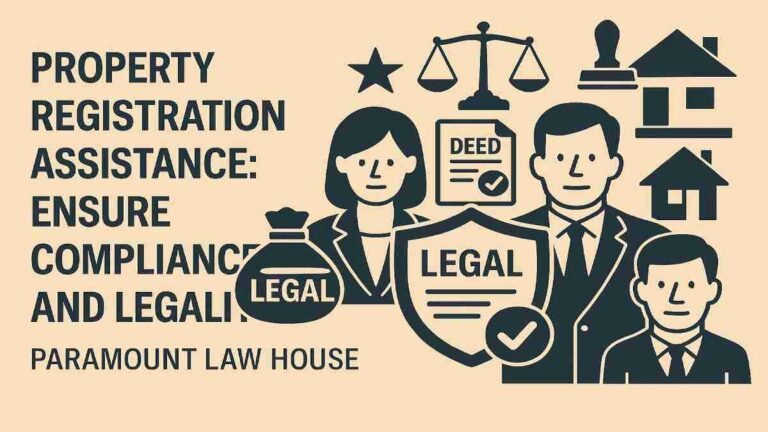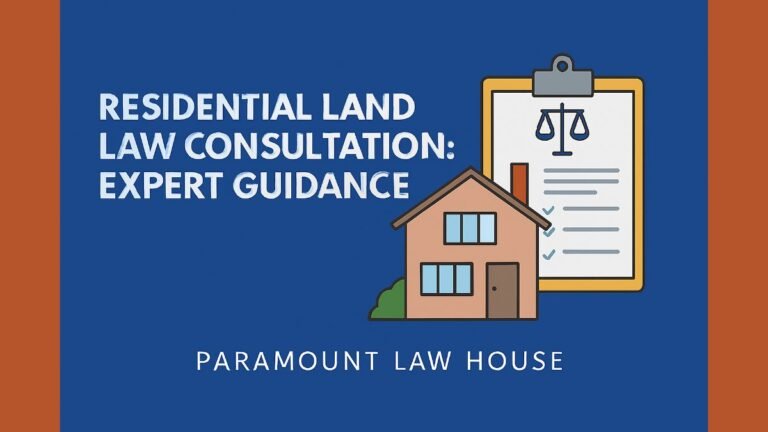Illegal Possession of Immovable Property: Legal Remedies Available
Illegal Possession of Immovable Property: At Paramount Law House: Property Lawyers 24×7, we understand the distress caused by the illegal possession of…
Illegal Possession of Immovable Property: At Paramount Law House: Property Lawyers 24×7, we understand the distress caused by the illegal possession of your property. It is a serious matter, and you are not alone. This article will guide you through the legal remedies available to reclaim your immovable property. We will explain complex legal terms in simple language. Our goal is to empower you with the knowledge you need to take action.
Illegal Possession of Immovable Property: Your Legal Recourse
Understanding Illegal Possession
Firstly, let’s understand what constitutes illegal possession. It occurs when someone occupies your property without your lawful consent or any legal right. This unauthorized occupation can take many forms. For instance, it could be a tenant refusing to vacate after their lease expires. Or perhaps, it might involve a neighbor encroaching upon your land. Furthermore, it could even be a complete stranger taking over your property. In all these scenarios, the possessor lacks legal title or permission. Consequently, their occupation is unlawful.
Such illegal possession can cause significant emotional and financial hardship. You might lose rental income. Moreover, the value of your property could depreciate. Dealing with unauthorized occupants can also be incredibly stressful. Therefore, it is crucial to understand your legal rights and the remedies available to you.
Legal Framework in India
In India, several laws address the issue of illegal possession. The primary legislation dealing with property rights is the Transfer of Property Act, 1882. Additionally, the Specific Relief Act, 1963, provides remedies for the recovery of possession. Moreover, the Indian Penal Code, 1860, also contains provisions that can be relevant in certain cases of illegal occupation, particularly those involving criminal trespass. Furthermore, civil courts have inherent powers to address such grievances. Therefore, a robust legal framework exists to protect your property rights.
Key Legal Remedies Available
Several legal avenues are available to you when faced with illegal possession. Let’s explore some of the most common and effective remedies.
1. Suit for Recovery of Possession
Firstly, one of the most direct remedies is filing a suit for recovery of possession. This is a civil suit filed in the appropriate court. In this suit, you, as the rightful owner, will seek a court order directing the illegal possessor to hand over the property to you. To succeed in such a suit, you must prove your ownership of the property. You will need to present relevant documents. These documents might include your title deed, sale agreement, or other records establishing your legal right to the property.
Furthermore, you must also prove that the defendant is in illegal possession of the property. Once the court is satisfied with your evidence, it will pass a decree in your favor. This decree will order the illegal possessor to vacate the property and restore its possession to you. Moreover, the court can also grant consequential reliefs. These might include orders for the recovery of mesne profits. Mesne profits refer to the damages or compensation for the wrongful possession of your property. Therefore, a suit for recovery of possession is a powerful tool to reclaim your property.
2. Summary Suit Under Order XXXVII of the Code of Civil Procedure, 1908
Secondly, in certain cases, a quicker remedy might be available through a summary suit. Order XXXVII of the Code of Civil Procedure, 1908, allows for a speedy disposal of suits based on negotiable instruments or where the plaintiff seeks only to recover a debt or liquidated demand in money payable by the defendant, with or without interest, arising on a written contract, or on an enactment, where the sum sought to be recovered is a fixed sum of money or in the nature of a debt other than a penalty; or on a guarantee, where the claim is in respect of a debt or liquidated demand. While not directly applicable to all cases of illegal possession of immovable property, it can be used in specific scenarios.
However, summary suits have specific requirements and a limited scope. The defendant’s ability to defend the suit is restricted. They can only defend if they obtain leave from the court by showing that they have a substantial defense to raise. Consequently, this procedure can expedite the process of recovering possession and outstanding payments in suitable cases.
3. Action Under Section 6 of the Specific Relief Act, 1963 (Suit by Person Dispossessed of Immovable Property)
Thirdly, Section 6 of the Specific Relief Act, 1963, provides another important remedy. This section allows a person who has been dispossessed of immovable property without their consent and otherwise than in due course of law to file a suit for recovery of possession. Importantly, this suit can be filed even if the plaintiff does not have perfect title to the property. What matters is their prior possession.
Furthermore, a suit under Section 6 must be brought within six months from the date of dispossession. If successful, the court will order the defendant to restore possession to the plaintiff. However, it is crucial to note that no appeal lies from any decree passed in a suit instituted under this section, nor can any review of such decree be allowed. Nevertheless, the party who loses in a suit under Section 6 can still file a regular suit based on title. Therefore, this remedy provides a swift way to regain possession based on prior possessory rights.
4. Criminal Complaint
Fourthly, in situations where the illegal possession involves elements of force, threat, or criminal trespass, filing a criminal complaint with the police might be appropriate. Criminal trespass is defined under Section 441 of the Indian Penal Code, 1860. It involves entering or remaining unlawfully upon someone else’s property with the intent to commit an offense or to intimidate, insult, or annoy any person in possession of such property.
Subsequently, if the police find merit in your complaint, they can register a First Information Report (FIR) and initiate an investigation. While a criminal proceeding primarily aims to punish the wrongdoer, it can also create pressure on the illegal possessor to vacate the property. Moreover, in some cases, the police might assist in restoring possession under the orders of a Magistrate. Therefore, pursuing a criminal complaint can be a viable option in cases involving criminal intent.
5. Injunction Orders
Fifthly, you can also seek interim or permanent injunction orders from the court. An injunction is a judicial order restraining a person from doing a particular act. In the context of illegal possession, you might seek a temporary injunction to prevent the illegal possessor from further construction, damage, or transfer of the property during the pendency of your suit for recovery of possession.
Subsequently, if you succeed in your suit, the court can grant a permanent injunction. This permanent injunction will permanently restrain the defendant from interfering with your possession of the property. Therefore, injunctions are crucial tools to protect your property rights and prevent further complications during the legal process.
6. Utilizing Revenue Authorities
Sixthly, in some instances, particularly those involving encroachment on agricultural land or disputes related to land records, approaching the revenue authorities might provide a remedy. Revenue officials have the power to conduct surveys, demarcate boundaries, and resolve certain types of land disputes. While they may not have the same powers as civil courts to order eviction in all cases, their intervention can be helpful in establishing your rightful ownership and possession according to revenue records. Consequently, this can provide crucial evidence in any subsequent legal proceedings.
Choosing the Right Legal Remedy
Selecting the most appropriate legal remedy depends on the specific facts and circumstances of your case. Several factors need to be considered. These include the nature of the illegal possession, the availability of documentary evidence to prove your title, and the urgency of the situation.
For instance, if you were recently dispossessed unlawfully, a suit under Section 6 of the Specific Relief Act might be the quickest option. On the other hand, if you have clear title documents and seek not only possession but also compensation for the period of illegal occupation, a regular suit for recovery of possession would be more suitable. Furthermore, if the illegal possession involves criminal elements, pursuing a criminal complaint alongside a civil suit might be advisable.
Therefore, it is crucial to consult with an experienced property lawyer who can assess your situation and guide you on the best course of action. At Paramount Law House: Property Lawyers 24×7, our team of expert property lawyers is available round the clock to provide you with the necessary legal advice and assistance.
The Importance of Legal Counsel
Dealing with illegal possession of property can be a complex and challenging process. Navigating the intricacies of the law requires expertise and experience. A skilled property lawyer can provide invaluable assistance in several ways.
Firstly, they can help you understand your legal rights and the available remedies. Secondly, they can assist you in gathering the necessary documents and evidence to support your case. Thirdly, they can draft and file the appropriate legal proceedings on your behalf. Fourthly, they can represent you in court and present your case effectively. Finally, they can guide you through the entire legal process and ensure that your interests are protected.
Therefore, engaging a competent property lawyer is essential to achieve a favorable outcome in your case. At Paramount Law House: Property Lawyers 24×7, we are committed to providing you with the highest quality legal services and helping you reclaim your rightful possession of your property.
Frequently Asked Questions: Illegal Possession of Immovable Property
Firstly, do not resort to force. Instead, document everything meticulously. Gather any evidence of your ownership, such as title deeds and utility bills. Note down the date of illegal occupation and any interactions you have had with the possessor. Subsequently, immediately consult a property lawyer to understand your legal options and initiate appropriate action.
Generally, no. Taking the law into your own hands can lead to legal complications for you. Indian law emphasizes due process. Therefore, you must approach the appropriate legal forums, such as civil courts, to seek an eviction order.
The timeline can vary significantly depending on several factors. These factors include the complexity of the case, the specific legal remedy pursued, and the workload of the court. A summary suit might be faster than a regular suit for recovery of possession. However, it is difficult to provide an exact time frame.
To prove illegal possession, you primarily need to establish your rightful ownership of the property through documents like title deeds, sale agreements, or inheritance records. Additionally, you need to demonstrate that the occupant is in possession without your consent or any legal basis, such as an expired lease agreement.
The costs can include court fees, lawyer’s fees, and other incidental expenses. Lawyer’s fees will vary depending on the advocate’s experience and the complexity of the case. Court fees are usually a percentage of the property’s value. It is advisable to discuss the potential costs with your lawyer upfront.
Conclusion
In conclusion, the illegal possession of immovable property is a serious legal issue with several potential remedies available under Indian law. These remedies include filing a suit for recovery of possession, pursuing a summary suit in specific cases, seeking relief under Section 6 of the Specific Relief Act, lodging a criminal complaint where applicable, obtaining injunction orders, and utilizing revenue authorities in certain situations. Choosing the right legal strategy depends on the unique circumstances of your case. Therefore, it is highly recommended to seek the advice of experienced property lawyers, such as the team at Paramount Law House: Property Lawyers 24×7, to navigate this complex legal landscape effectively and protect your property rights. We are here to assist you in reclaiming what is rightfully yours.
Read More
- Indian Easements: Legal Guidance for Property Owners
- Industrial Land Law Experts: Ensure Compliance and Protection
- Injunction Order Assistance: Protect Your Property Rights
- Joint Ownership of Property: Legal Assistance Available
- Land Acquisition Services: Navigate Legal Procedures
- Department of Land Resources






